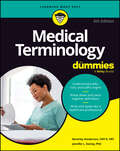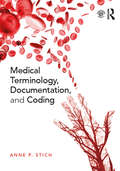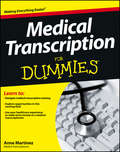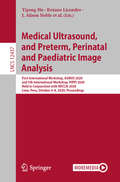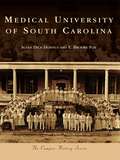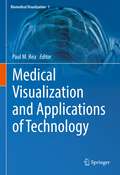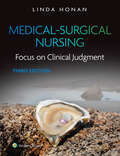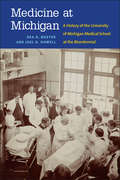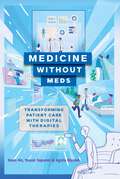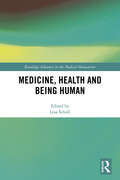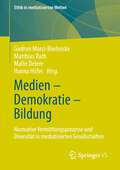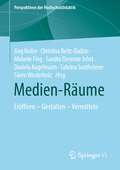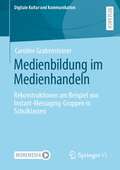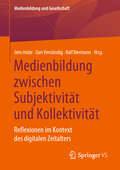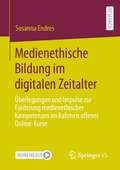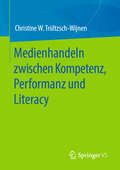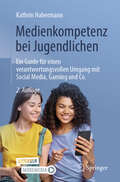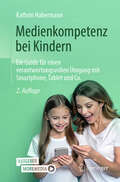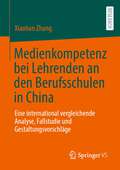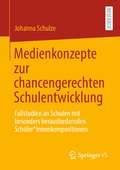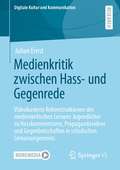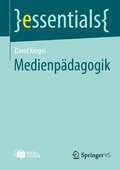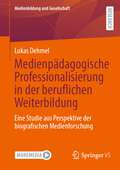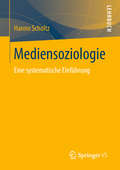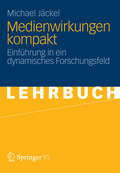- Table View
- List View
Medical Terminology For Dummies
by Beverley Henderson Jennifer L. DorseyBecome fluent in the standardized language of all medical fields Medical Terminology For Dummies is a resource for current and prospective healthcare professionals who need to understand medical terms, from common to complex. This book clearly explains how to quickly identify, pronounce, define, and apply medical terms in a healthcare setting. You'll also find ideas for creating mind maps and games to help you study and retain the language of medicine. Pair those study tools with an understanding of the history and origins of key prefixes, suffixes, and roots, and you'll be confident in no time. This updated guide covers the 2022 updates to ICD-10 codes, and it includes added terminology related to public health and infectious diseases. Whatever healthcare field you're in, this book will serve as your glossary of terms and a gateway to future learning opportunities. Understand prefixes, roots, and suffixes, so you can confidently work out the meanings of complex terms Practice defining medical terms and get help memorizing key vocabulary elements Enhance your professional expertise in any healthcare setting Improve the safety and accuracy of medical communications All medical and healthcare related careers require some knowledge of medical terminology. Start off on the right foot—or brush up what you already know—with Medical Terminology For Dummies.
Medical Terminology, Documentation, and Coding
by Anne P. StichGiving students the strongest possible baseline in medical terminology, along with the how and why it is used in documentation and basic coding, this is a vital text for all students taking courses in the area. It allows readers to use their knowledge immediately in any medical setting (including being a patient), in their workplaces, and in the journey to future careers. Using a body systems approach to medical terminology, this textbook supports students to: Recognize words by constructing medical terms based on root words, prefixes, linking forms, and suffixes. Define, spell, pronounce, and use medical terms, acronyms, and abbreviations in the context of patient care with appropriate documentation and coding examples. Identify anatomical directions, fundamental anatomical terminology, basic physiologic functions, and common pathology of all major organ systems with related medical investigation tools, procedures, and pharmaceuticals. Relate the use of medical language and medical record-keeping to the SOAP format, common medical reports, and coding tools, along with their impact on patient care. Accompanied by plentiful color illustrations and activities, as well as a companion website with resources for both instructors and students, this is a fresh and readable textbook.
Medical Transcription For Dummies
by Anne MartinezThe fast and easy way to explore a medical transcription careerFlexibility is one of the most enticing aspects of a career in medical transcription. Perfect for in the office, at home, or on vacation, medical transcriptionists can often create lifestyle-appropriate schedules. The transcription field also appeals as a part-time, post-retirement income source for ex-healthcare-industry workers. If you're interested in a career in this growing field, Medical Transcription For Dummies serves as an accessible entry point. With guidance on getting through training and certification and exploring opportunities within the myriad different kinds of employment arrangements, Medical Transcription For Dummies gives you everything you need to get started in medical transcription.Guides you on getting though medical transcription training and certificationIncludes expert advice and tips on how to approach complex medical jargon and understand proceduresPlain-English explanations of medical terminology, anatomy and physiology, diagnostic procedures, pharmacology, and treatment assessmentsWhether used as a classroom supplement or a desk reference, students and professionals alike can benefit from Medical Transcription For Dummies.
Medical Ultrasound, and Preterm, Perinatal and Paediatric Image Analysis: First International Workshop, ASMUS 2020, and 5th International Workshop, PIPPI 2020, Held in Conjunction with MICCAI 2020, Lima, Peru, October 4-8, 2020, Proceedings (Lecture Notes in Computer Science #12437)
by Stephen Aylward Andrew Melbourne Roxane Licandro Jana Hutter Esra Abaci Turk J. Alison Noble Yipeng Hu Jordina Torrents BarrenaThis book constitutes the proceedings of the First International Workshop on Advances in Simplifying Medical UltraSound, ASMUS 2020, and the 5th International Workshop on Perinatal, Preterm and Paediatric Image Analysis, PIPPI 2020, held in conjunction with MICCAI 2020, the 23rd International Conference on Medical Image Computing and Computer-Assisted Intervention. The conference was planned to take place in Lima, Peru, but changed to an online event due to the Coronavirus pandemic. For ASMUS 2020, 19 contributions were accepted from 26 submissions; the 14 contributions from the PIPPI workshop were carefully reviewed and selected from 21 submissions. The papers were organized in topical sections named: diagnosis and measurement; segmentation, captioning and enhancement; localisation and guidance; robotics and skill assessment, and PIPPI 2020.
Medical University of South Carolina, The (Campus History)
by E. Brooke Fox Susan Dick HoffiusThe Medical University of South Carolina, founded in Charleston in 1824 by the Medical Society of South Carolina, consists of six colleges, each with its own rich history. The College of Medicine was the tenth medical school in the country and the first medical school in the Deep South. Its graduates fought and healed during times of war, tended to the injured after hurricanes and earthquakes, and battled epidemic diseases that swept through the South. The College of Nursing and the College of Pharmacy were established within years of each other at the close of the 19th century. The College of Graduate Studies, the College of Dental Medicine, and the College of Health Professions were established in the latter half of the 20th century to fill some of the state's most crucial medical needs. Over the years, the Medical University of South Carolina has educated thousands of doctors, nurses, pharmacists, dentists, and other health care workers and scientists.
Medical Visualization and Applications of Technology (Biomedical Visualization #1)
by Paul M. ReaThis edited book explores the use of technology to enable us to visualize the life sciences in a more meaningful and engaging way. It will enable those interested in visualization techniques to gain a better understanding of the applications that can be used in visualization, imaging and analysis, education, engagement and training. The reader will also be able to learn about the use of visualization techniques and technologies for the historical and forensic settings. The reader will be able to explore the utilization of technologies from a number of fields to enable an engaging and meaningful visual representation of the biomedical sciences. We have something for a diverse and inclusive audience ranging from healthcare, patient education, animal health and disease and pedagogies around the use of technologies in these related fields. The first four chapters cover healthcare and detail how technology can be used to illustrate emergency surgical access to the airway, pressure sores, robotic surgery in partial nephrectomy, and respiratory viruses. The last six chapters in the education section cover augmented reality and learning neuroanatomy, historical artefacts, virtual reality in canine anatomy, holograms to educate children in cardiothoracic anatomy, 3D models of cetaceans, and the impact of the pandemic on digital anatomical educational resources.
Medical-Surgical Nursing: Focus on Clinical Judgment
by Linda HonanConfidently meet the demands of transitioning students into practice-ready nurses with Medical-Surgical Nursing: Focus on Clinical Judgment, 3rd Edition. Expertly curated by experienced clinician and nursing educator Dr. Linda Honan, this practical approach distills complex concepts down to need-to-know details through the perspective of practicing nurses, establishing a comprehensive foundation in medical-surgical nursing by way of the most commonly encountered conditions and situations. Extensive updates throughout this 3rd Edition broaden your students’ perspectives, cultivate their clinical judgment, and prepare them for success from the Next Generation NCLEX® to the day-to-day challenges of today’s medical-surgical nursing practice.
Medicine at Michigan: A History of the University of Michigan Medical School at the Bicentennial
by Dea Boster Joel D. HowellA trailblazer in American medical education since 1850, the Medical School at the University of Michigan was the first program in the United States to own and operate its own hospital and the earliest major medical school to admit women. In the late nineteenth century, the School emerged as a frontrunner in modern scientific medical education in the United States, and one of the first in the nation to implement both required clinical clerkships and laboratory science as part of their curriculum, including the first full laboratory course in bacteriology. Decades later, the Medical School remained at the vanguard of medical education by increasing its focus on research, and these efforts resulted in world-changing breakthroughs such as field-testing the first safe polio vaccine, proposing a genetic mechanism for sickle cell anemia, inventing the fiber-optic endoscope, and cloning the gene responsible for cystic fibrosis. The Medical School’s history is not without its growing pains: alongside top-tier education and incredible innovation came times of stress with the broader University and Ann Arbor communities, complex expectations and realities for student diversity, and many controversies over curriculum and methodology. Medicine at Michigan explores how the School has dealt with changes in medical science, practice, and social climates over the past 150 years and illuminates the complicated interactions between economic, social, and cultural trends and medical education at the University of Michigan and across the nation. This book will appeal to readers interested in the history of medicine as well as current and former medical faculty members, students, and employees of the University of Michigan Medical School.
Medicine without Meds: Transforming Patient Care With Digital Therapies
by Dean Ho Yoann Sapanel Agata BlasiakMedicine, Health and Being Human (Routledge Advances in the Medical Humanities)
by Lesa SchollMedicine, Health and Being Human begins a conversation to explore how the medical has defined us: that is, the ways in which perspectives of medicine and health have affected cultural understandings of what it means to be human. With chapters that span from the early modern period through to the contemporary world, and are drawn from a range of disciplines, this volume holds that incremental historical and cultural influences have brought about an understanding of humanity in which the medical is ingrained, consciously or unconsciously, usually as a mode of legitimisation. Divided into three parts, the book follows a narrative path from the integrity of the human soul, through to the integrity of the material human body, then finally brought together through engaging with end-of-life responses. Part 1 examines the move from spirituality to psychiatry in terms of the way medical science has influenced cultural understandings of the mind. Part 2 interrogates the role that medicine has played in the nineteenth and twentieth centuries in constructing and deconstructing the self and other, including the fusion of visual objectivity and the scientific gaze in constructing perceptions of humanity. Part 3 looks at the limits of medicine when the integrity of one body breaks down. It contends with the ultimate question of the extent to which humanity is confined within the integrity of the human body, and how medicine and the humanities work together toward responding to the finality of death. This is a valuable contribution for all those interested in the medical humanities, history of medicine, history of ideas and the social approaches to health and illness.
Medien – Demokratie – Bildung: Normative Vermittlungsprozesse und Diversität in mediatisierten Gesellschaften (Ethik in mediatisierten Welten)
by Matthias Rath Gudrun Marci-Boehncke Malte Delere Hanna HöferDie Beiträge des Bandes thematisieren den Zusammenhang von Medien, Demokratie und Bildung im Dreischritt „Information” als Basis politischer Öffentlichkeit, „Partizipation” als anzustrebende demokratische Praxis sowie „Reflexion” auf die grundlegenden Wertvoraussetzungen gelingender gesellschaftlicher Organisation die digitale Kommunikation. Sie behandeln diesen Dreischritt dabei unter ethischen sowie Bildungsgesichtspunkten und formulieren Folgerungen für Bildungsdiskurse in demokratischen Gesellschaften.
Medien-Räume: Eröffnen – Gestalten – Vermitteln (Perspektiven der Hochschuldidaktik)
by Jörg Noller Christina Beitz-Radzio Daniela Kugelmann Sabrina Sontheimer Sören Westerholz Melanie Förg Sandra Eleonore JohstLehren und Lernen, verstanden als komplexe Vermittlung und Verarbeitung von Inhalten, findet immer in räumlichen Kontexten statt, die hinderlich oder förderlich sein können. Diese Räume können von ganz verschiedener Art sein und sie müssen sich keineswegs auf den Hörsaal und Seminarraum beschränken. Der Sammelband, der aus zwei Symposien des Münchner-Dozierenden-Netzwerks in den Jahren 2020 und 2021 hervorgegangen ist, möchte diese Räume erkunden, medial reflektieren und zugleich neue Räume für die Lehre eröffnen. Folgende Fragen stehen dabei im Zentrum: Welche Lehr- und Lernräume innerhalb und außerhalb der Hochschule haben sich bislang bewährt? Wo liegen ihre Grenzen, wo ihre Möglichkeiten? Wie lassen sich Lehr- und Lernräume gestalten? Welche Materialien, welche Technik und welche Medien haben sich bewährt oder bieten neue Möglichkeiten?
Medienbildung im Medienhandeln: Rekonstruktionen am Beispiel von Instant-Messaging-Gruppen in Schulklassen (Digitale Kultur und Kommunikation #11)
by Caroline GrabensteinerWie entfaltet sich Bildung angesichts der Handlungsmöglichkeiten in digitalen Medien? In dieser Grounded-Theory Studie werden Fragen zu Medienbildung und Medienhandeln verknüpft. Das Phänomen Instant-Messaging-Gruppen in Schulklassen steht im Zentrum der Analyse. Ergebnis ist ein Theoriemodell zur Rekonstruktion der Herstellung von Selbst- und Weltrelationen auf materialer, sozialer und biografischer Ebene im Prozess der Konstruktion von Handlungskontexten, Themen und sozialen Praktiken der Medienkommunikation mit dem Potenzial zur Erweiterung auf andere Soziale Medien.
Medienbildung zwischen Subjektivität und Kollektivität: Reflexionen im Kontext des digitalen Zeitalters (Medienbildung und Gesellschaft #45)
by Ralf Biermann Dan Verständig Jens HolzeDer Band vereint ausgewählte interdisziplinäre Zugänge zu Entwicklungen und Problemstellungen rund um das Verhältnis von Subjektivität und Kollektivität. Die Autorinnen und Autoren gehen dabei der Frage nach, wie Konzepte von Subjektivität und Kollektivität im digitalen Zeitalter angemessen beschrieben und für eine zeitgenössische Theoriebildung gewendet werden können. Es werden Themen, wie kollektive Grenzüberschreitung, Vernetzung als Subjektivierungsform und sozio-mediale Habituskonfigurationen im Horizont der Medienbildung verhandelt. Damit leistet der Band auch einen Beitrag zum Diskurs um das Verhältnis von Bildung und Subjektivierung.
Medienethische Bildung im digitalen Zeitalter: Überlegungen und Impulse zur Förderung medienethischer Kompetenzen im Rahmen offener Online-Kurse
by Susanna EndresDigitale Räume versprechen ein Mehr an Teilhabemöglichkeiten: Optimistisch könnte man konstatieren, dass sie zu einer Demokratisierung des Diskurses beitragen. Hierfür bedarf es jedoch eines ethisch-verantwortlichen Umgangs mit digitalen Medien: Medienethische Bildung und medienethische Kompetenzen gewinnen an Bedeutung. Doch wie genau könnten und sollten entsprechende Konzepte definiert sein? Wie sollten sie ausgestaltet sein und wie können sie in die Gesellschaft hineinwirken? Im Rückgriff auf bestehende Modelle und Definitionen aus der Medienpädagogik und der Ethikdidaktik werden die Begriffe „medienethische Bildung“ und „medienethische Kompetenz“ erörtert und mit Blick auf die Anforderungen der Digitalisierung konkretisiert. Welche didaktischen Möglichkeiten sich aus den theoretisch erarbeiteten Überlegungen ableiten lassen, zeigt die Arbeit exemplarisch anhand eines offenen Online-Kurses auf, dessen Entwicklung im Rahmen einer Design-based Research-Studie forschend begleitet wurde. Hierzu wurden Leitfadeninterviews mit Kursexperten, -interessierten und -teilnehmenden geführt und im Rahmen qualitativer Inhaltsanalysen ausgewertet. Die Ergebnisse der Studie geben Hinweise darauf, welche Faktoren spezifisch für die Ausgestaltung medienethischer Bildungsangebote, aber auch für E-Learning-Angebote ganz allgemein, förderlich sein können.
Medienhandeln zwischen Kompetenz, Performanz und Literacy
by Christine W. Trültzsch-WijnenDas Buch diskutiert die soziale und individuelle Bedingtheit von Medienkompetenz. Im Mittelpunkt steht die Frage, wie sich das Medienhandeln von Individuen im Hinblick auf deren Medienkompetenz, im Sinne eines sicheren und selbstbestimmten Handelns im Umgang mit Medien, erklären und beurteilen lässt. Dies setzt eine Betrachtung des Medienhandelns vor dem Hintergrund der Beziehungen zwischen der Kompetenz zu Handeln, als Summe von Fähigkeiten, Fertigkeiten und Wissen sowie der kognitiven Beherrschung von Regeln des Verhaltens (moralische Regeln, rechtliche Regeln sowie Regeln der Klugheit), und der Performanz, als tatsächliches Handeln eines Individuums, voraus. Dabei wird auf theoretischer Ebene der Frage nach der sozialen Determinierung eines selbstbestimmten Handelns im Umgang mit Medien einschließlich dafür erforderlicher Fähigkeiten, Fertigkeiten sowie des damit verbundenen Wissens nachgegangen. Außerdem wird das Verhältnis des deutschsprachigen Medienkompetenzdiskurses zum internationalen Diskurs über media literacy erläutert. Es werden Gemeinsamkeiten und Unterschiede herausgearbeitet und Potentiale für eine gegenseitige Befruchtung beider Perspektiven aufgezeigt. Darüber hinaus wird die empirische Relevanz und Anwendbarkeit dieser theoretischen Überlegungen anhand zweier Studien illustriert.
Medienkompetenz bei Jugendlichen: Ein Guide für einen verantwortungsvollen Umgang mit Social Media, Gaming und Co.
by Kathrin HabermannSurfen, Zocken, Posten, Streamen Haben Sie sich schon einmal gefragt, was Snapchat eigentlich wirklich ist und wie Social Media Apps Geld mit Daten verdienen? Oder wie gefährlich Online-Games wirklich sind beziehungsweise, ob sie sogar Vorteile für die Entwicklung bieten? Worauf sollte man beim Thema Datenschutz konkret achten? Wie sieht eine gelungene Anleitung zum Umgang mit digitalen Medien aus? Wie kann man ChatGPT erfolgreich in den Schulalltag integrieren? Erfahren Sie in diesem Ratgeber für Eltern, Pädagog*innen und Therapeut*innen, was Jugendliche selbst über ihren Medienkonsum denken und welche Medienkompetenzen heute notwendig sind, um gesellschaftlich nicht den Anschluss zu verlieren. Aus dem Inhalt: Auswirkungen digitaler Medien auf Gehirnentwicklung, Konzentration und Suchtverhalten von Jugendlichen, Einsatz digitaler Medien in Schulen, Chancen und Risiken von Social Media und Gaming, Onlinehandel und Datenschutz, Richtlinien zur gesunden Screentime und Anlaufstellen für Eltern. Plus Material- und Spiellisten, Mediennutzungsvertrag und mehr zum Download und als Kopiervorlage. Diese 2. Auflage ist komplett überarbeitet und aktualisiert mit der neuesten Literatur und Studienlage.
Medienkompetenz bei Kindern: Ein Guide für einen verantwortungsvollen Umgang mit Smartphone, Tablet und Co.
by Kathrin HabermannDieser Ratgeber unterstützt Eltern, Pädagog*innen und Therapeut*innen dabei, die Faszination von Smartphones für Kinder zu verstehen, die Bedeutung von Langeweile zu erkennen und ihren Kindern einen verantwortungsvollen Umgang mit digitalen Medien zu vermitteln. Lernen Sie, wie Sie mit der ständigen Präsenz von Smartphones, Tablets und Co. gelassen und kreativ umgehen können und welche wissenschaftlichen Erkenntnisse zu diesem Thema relevant für die Entwicklung Ihres Kindes sind. Bieten Sie Kindern attraktive Alternativen und zahlreiche einfache Spiele für den täglichen Gebrauch. Entdecken Sie spannende und entwicklungsfördernde Aktivitäten, die wenig Material und kaum Vorbereitungszeit erfordern. Erhalten Sie Praxistipps für herausfordernde Situationen wie Restaurantbesuche, lange Autofahrten oder Bahnreisen. Nach diesem Ratgeber sind Sie bestens vorbereitet. Plus: Wissenschaftliche Hintergründe und aktuelle Studien übersichtlich und verständlich aufbereitet, Fragebögen und Checklisten zur Ermittlung des Medienkonsums, Material- und Spiellisten, Mediennutzungsvertrag und mehr zum Download und als Kopiervorlage.
Medienkompetenz bei Lehrenden an den Berufsschulen in China: Eine international vergleichende Analyse, Fallstudie und Gestaltungsvorschläge
by Xiaohan ZhangIn diesem Band werden Forschungsergebnisse zu schulischer Medienbildung und Medienkompetenz sowie den darauf bezogenen Theorien in China und Deutschland sortiert und zusammengefasst. Als Theorieergänzung werden auch die technische Ausstattung in der Schule, Kenntnisse und Einstellungen sowie Erfahrungen der Lehrer, der Medieneinsatz im Unterricht, der Medienumgang der Schüler, die Lehrerbildung im Medienzusammenhang usw. erläutert. Es wird ein Beitrag zur theoretischen und empirischen Fundierung der medienpädagogischen Kompetenz von Lehrkräften in chinesischen Berufsschulen (mit einer standardisierten Befragung und einem leitfadengestützten Interview als empirischer Teil) geleistet. Abschließend werden Empfehlungen zur Verbesserung der Medienbildung in China und Deutschland gegeben.
Medienkonzepte zur chancengerechten Schulentwicklung: Fallstudien an Schulen mit besonders herausfordernden Schüler*innenkompositionen
by Johanna SchulzeJohanna Schulze untersucht in ihrer Arbeit mithilfe längsschnittlich angelegter Fallstudien und eines Mixed-Methods-Ansatzes die forschungsleitende Fragestellung, inwiefern und unter welchen Bedingungen schulische Medienkonzepte ihr Potenzial als Instrumente der Schulentwicklung an Schulen der Sekundarstufe I mit besonders herausfordernden Schüler*innenkompositionen im Bundesland Nordrhein-Westfalen entfalten können. Mit den Ergebnissen werden hemmende und förderliche Bedingungsfaktoren für den Implementierungsprozess schulischer Medienkonzepte auf den unterschiedlichen Ebenen von Schule offengelegt und auf einen inhaltlichen Entwicklungsbedarf dieser verwiesen.
Medienkritik zwischen Hass- und Gegenrede: Videobasierte Rekonstruktionen des medienkritischen Lernens Jugendlicher zu Hasskommentaren, Propagandavideos und Gegenbotschaften in schulischen Lernarrangements (Digitale Kultur und Kommunikation #9)
by Julian ErnstHate Speech im Internet ist für Jugendliche Alltag. Längst sind hasserfüllte Artikulationen daher Gegenstand medienpädagogischer Lernarrangements, die u.a. mittels sogenannter „Gegenbotschaften“ auf die Förderung von Medienkritikfähigkeit abzielen. Doch was lernen Jugendliche in der medienkritischen Auseinandersetzung mit Hasskommentaren, Propagandavideos und Gegenbotschaften? Anhand von Videoaufnahmen wird in diesem Buch das medienkritische Lernen Jugendlicher zwischen Hass- und Gegenrede empirisch rekonstruiert. Besonderes Augenmerk liegt dabei auf den Perspektiven Jugendlicher, die mittels des Einsatzes von Körperkameras methodisch spezifisch berücksichtigt werden. Neben theoretischen Überlegungen und empirischen Befunden zur Medienkritikfähigkeit Jugendlicher bietet der Band didaktische Ansätze für die Gestaltung medienbildnerischer Lernarrangements im Kontext von Hass- und Gegenrede im Internet.
Medienpädagogik (essentials)
by David KergelDer vorliegende Band liefert eine kurze praxisorientierte Einführung in die Medienpädagogik. Dabei wird die Geschichte der Medienpädagogik von der Bewahrpädagogik über eine handlungs- und produktionsorientierte Medienpädagogik bis hin zum Begriff der Medienkompetenz dargestellt. Zudem werden Eckpunkte zeitgemäßer Medienpädagogik in einer digitalen Gesellschaft skizziert sowie die Rahmenbedingungen bzw. die Infrastruktur medienpädagogischen Arbeitens beschrieben. Ergänzt wird das Buch durch einen Onlinekurs. Den kostenlosen Zugang zum Onlinekurs finden Sie direkt im Buch.
Medienpädagogische Professionalisierung in der beruflichen Weiterbildung: Eine Studie aus Perspektive der biografischen Medienforschung (Medienbildung und Gesellschaft #52)
by Lukas DehmelDas Buch setzt sich in einer qualitativ konzeptualisierten empirischen Analyse mit der medienpädagogischen Professionalisierung einer medienaffinen Zielgruppe von Lehrenden innerhalb der beruflichen Weiterbildung auseinander. Zusammenfassend geht es hierbei um die den gesamten Lebensverlauf begleitenden Prozesse und Prozeduren zur individuellen Beschäftigung mit Medien, um im Zusammenhang mit dem eigenen Lehrprozedere kompetent mit ihnen zu agieren. Die Arbeit schließt hier an Überlegungen aus der Erwachsenen- und Weiterbildungswissenschaft an und entwickelt sie mit Bezug auf medienpädagogische Forschungsansätze und Konzepte weiter. Zentral wichtig ist hierbei die Annahme, dass zugehörige medienverwiesene Vorgänge in den Biografien der Lehrenden nicht nur auf einer Ebene des Lehrens und Lernens ablaufen. Die Studie definiert zudem eine inhaltliche und eine organisatorische Ebene medienpädagogischer Professionalisierung und macht sie ebenso zum Gegenstand der qualitativ ausgerichteten Analyse. Dafür knüpft die Untersuchung an die biografietheoretischen Ideengrundlagen zur Beschreibung individueller Professionalisierung in der Erwachsenen- und Weiterbildung an und verbindet sie mit dem in der Medienpädagogik entwickelten Analyseparadigma der biografischen Medienforschung.
Mediensoziologie: Eine systematische Einführung
by Hanno ScholtzWas haben Veränderungen in Gesellschaften und ihren Medien miteinander zu tun? Wo tragen Medien zu gesellschaftlichen Problemen bei und wo können sie diese lösen helfen? Wie wird darüber in der Wissenschaft diskutiert, und wie hängen diese Diskussionen zusammen? Ausgehend von Individuen mit ihren Wahrnehmungen und Handlungsentscheidungen, den von ihnen begründeten Institutionen, und einer knappen Definition von Medien bietet dieser Einführungsband in die Mediensoziologie eine systematische Darstellung, die einen Überblick ermöglicht und Probleme und im Fach geführte Diskussionen einordnen lässt.
